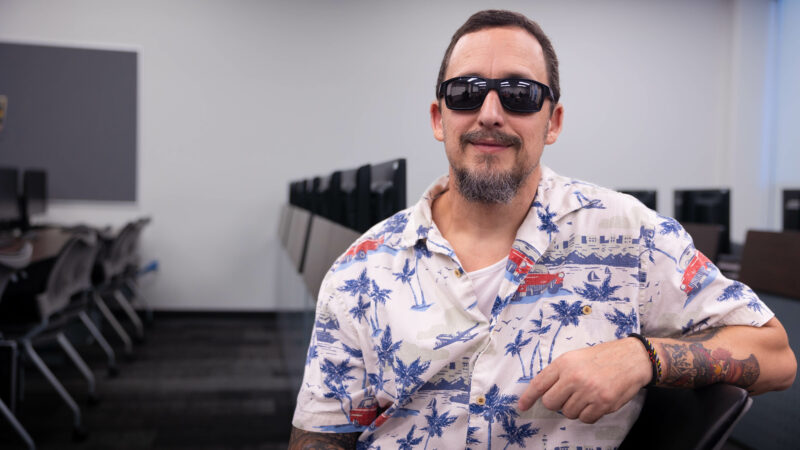Visually impaired student encourages Polk State peers to embrace opportunities

Andy Andrews says his proudest moment is returning to school at 52. He references lack of training and classes with peers half his age — common insecurities among older students — before sharing that his visual impairment is also an obstacle.
Andrews, a student in Polk State College’s Supply Chain Management Program, has retinitis pigmentosa, a rare genetic eye disease that causes vision loss over time. Diagnosed at 7 years old, he was told that he would be completely blind by 21.
“But I’m here now, still with some vision,” he exclaimed. “My advice to students is to take the training. I wish I would have embraced [education] when I had my vision. I knew I would go blind, but I kept pushing back. That was my pride.”
Andrews spoke to a room full of Polk State students, faculty, and staff during Disability Awareness Month. The Office of Disability and Counseling Services facilitates educational opportunities in which students are empowered to share their experiences and increase awareness about inclusivity across the College community.
“My advice to students is to take the training. I wish I would have embraced [education] when I had my vision. I knew I would go blind, but I kept pushing back. That was my pride.”
“Our office is dedicated to providing students with the support and resources they need to be successful,” Director of Disability and Counseling Services Kim Persall said. “Our events foster connections with and increased understanding about individuals who are living with disabilities.”
Andrews was born in Virginia and spent 30 years in California before moving to Florida in March. After a 25-year career working in a distribution warehouse, his diminishing eyesight became hazardous as forklifts began “sneaking up on me,” he explained.
Seeking new job opportunities, Andrews sought resources through the Florida Division of Blind Services, which connected him to Lighthouse for the Blind and Low Vision, and ultimately Polk State College.
“To this day, there’s not a lot of knowledge about my condition and there is no treatment,” Andrews explained. “I am fortunate because my condition was dormant for most of my life.”
He was able to drive until 2010. Now, he is getting used to a mobility cane, which is white with red markings to signal to others that he has low but somewhat useful vision.
Andrews shared with the audience some useful tips on how to interact with and assist visually impaired individuals.
“The biggest misconception is that we either want someone to let us figure [everything] out or we want someone to do [everything] for us,” he said. “In reality, we need something in the middle.
“The best thing to do is to simply ask if we need help,” he added. “Do not walk up and grab my shoulder, and immediately try to help. That is incredibly startling. The best thing to do is just ask.”
Pearsall and colleague Dionne Formey, Disability Services Coordinator, are no strangers to helping students with a variety of conditions and needs. More than 370 students have sought accommodations through their office for the Fall 2024 Semester.
Andrews, for example, benefits from JAWS software which assists students in reading web pages and online materials. It also assists Andrews with keyboard shortcuts and his ability to complete assignments.
“I learned JAWS just so that I could attend college,” he said. “Technology has allowed me to do what I have always wanted to do. I want to create code and now there is software that I can dictate [verbally] what I want it to do, and it will do it for me.”
His goal is to get back to work and serve as an inspiration for his two grandchildren.
“With my background in distribution, I am looking to work in supply chain and logistics, maybe in analysis or shipping operations,” he added. “Polk State’s program is exactly what I need, and the instructors have been accommodating as well.”
Andrew’s conversation for Disability Awareness Month ended with a Q&A session in which he insisted the audience could ask him anything — “I won’t be offended,” he shared.
Students and employees took the opportunity to connect with Andrews, inspired by both his story and openness about his experiences.
Pearsall pointed out that Andrews, despite his limited vision, still mows his own grass.
“Are there other things that you do that may surprise people?” she asked.
“Everything,” he exclaimed. “I do everything other people do, from cooking for myself to walking my dog, which is fun because he is not a seeing-eye dog and people freak out when he walks me right to the road.”
Andrews was also asked about increases in other senses since losing his vision.
“When you can’t see what a person looks like, you really sense their character,” he said. “It can be a difference in the tone of their voice. You really learn to listen to your gut.”
Lastly, he was questioned about his experience in his Polk State classes and with his professors.
“The professors are great at working with me to make sure I am successful,” Andrews said. “I encourage students to take advantage of the opportunities available here. Don’t procrastinate and don’t let anything stand in your way.”

